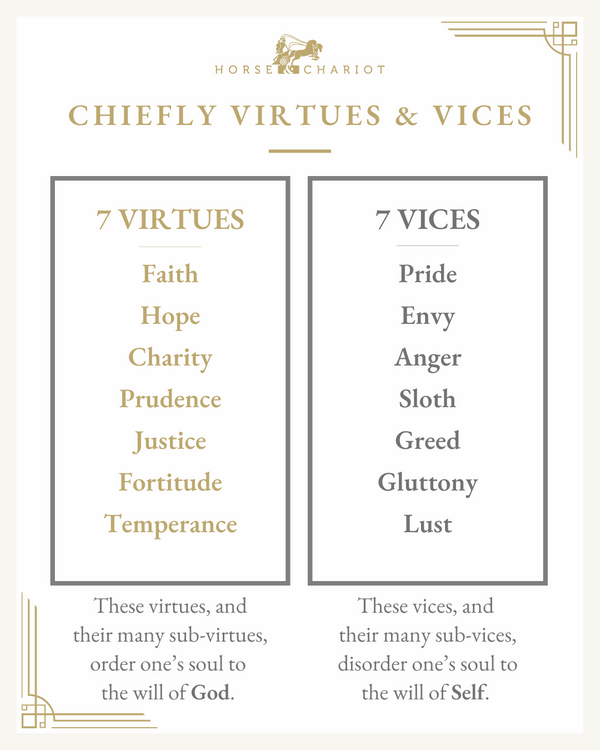All Series > Virtue & Vice > Part 8
Chiefly Virtues & Vices
Teaching of Virtue
Watch: On YouTube
Chiefly Virtues & Vices
There are seven chiefly virtues and vices.
The chiefly vices are…
- Pride—putting the will of self before the will of God
- Envy—sorrow toward another one’s good (or joy at another’s misfortune)
- Anger—unjust wrath toward God, neighbor, or the good
- Sloth—laziness toward the pursuit of God and the good
- Greed—immoderate desire to possess worldly things over spiritual things
- Gluttony—immoderate or immoral consumption
- Lust—immoderate or immoral sexual desire
These vices, and their many sub-vices, disorder one’s soul to the will of self.
The chiefly virtues are…
- Faith—to believe in Jesus Christ as the Lord and Savior
- Hope—to trust in God and yearn for eternal unity with Him in Heaven
- Charity—to love God, neighbor, and self, not for one's own sake, but for God’s sake
- Prudence—to discern and direct what's right
- Justice—to do and uphold what’s right
- Fortitude—to endure difficulties and trials
- Temperance—to moderate desires and temptations
These virtues, and their many sub-virtues, order one’s soul to the will of God. In the teachings to come, we will explore them all in great depth.
Scripture says, “As the deer longs for fountains of water, so my soul longs for you, O God” (Psalm 42:1). Learning and living the teachings of virtue quench the spiritual thirst of your mind, heart, and soul by enlightening your intellect, strengthening your will, and directing your passions to walk in the Spirit and be who God wills you to be.

Scroll down for the related scriptures, quotes, and lesson plan associated with this teaching.
Copyright © 2022 Horse & Chariot LLC. All rights reserved.
Visual Resource

Related Scripture
“As a deer longs for flowing streams, so my soul longs for you, O God.” — Psalm 42:1 (NRSV-CI)
“A good person brings good out of the treasure of good things in his heart; a bad person brings bad out of his treasure of bad things. For the mouth speaks what the heart is full of.” — Luke 6:45 (GNTD)
“The path of the just turns away from evils. He who guards his soul preserves his way.” — Proverbs 16:17 (CPDV)
“Just as you were once determined to turn away from God, now turn back and serve him with ten times more determination.” — Baruch 4:28 (GNTD)
“For desire is the root of all evils. Some persons, hungering in this way, have strayed from the faith and have entangled themselves in many sorrows. But you, O man of God, flee from these things, and truly pursue justice, piety, faith, charity, patience, meekness. Fight the good fight of faith. Take hold of the eternal life to which you have been called…” — 1 Timothy 6:10-12 (CPVD)
“Look at the proud! Their spirit is not right in them, but the righteous live by their faith.” — Habakkuk 2:4 (NRSV-CI)
“Do not allow evil to prevail, instead prevail over evil by means of goodness.” — Romans 12:21 (CPDV)
“...God is light, and in him there is no darkness. If we claim that we have fellowship with him, and yet we walk in darkness, then we are lying and not telling the truth. But if we walk in the light, just as he also is in the light, then we have fellowship with one another, and the blood of Jesus Christ, his Son, cleanses us from all sin. If we claim that we have no sin, then we are deceiving ourselves and the truth is not in us. If we confess our sins, then he is faithful and just, so as to forgive us our sins and to cleanse us from all iniquity.” — 1 John 1:5-9 (CPDV)
"If then you were raised with Christ, seek what is above, where Christ is seated at the right hand of God. Think of what is above, not of what is on earth. For you have died, and your life is hidden with Christ in God. When Christ your life appears, then you too will appear with him in glory. Put to death, then, the parts of you that are earthly: immorality, impurity, passion, evil desire, and the greed that is idolatry. Because of these the wrath of God is coming [upon the disobedient]. By these you too once conducted yourselves, when you lived in that way. But now you must put them all away: anger, fury, malice, slander, and obscene language out of your mouths. Stop lying to one another, since you have taken off the old self with its practices and have put on the new self, which is being renewed, for knowledge, in the image of its creator. Here there is not Greek and Jew, circumcision and uncircumcision, barbarian, Scythian, slave, free; but Christ is all and in all. Put on then, as God’s chosen ones, holy and beloved, heartfelt compassion, kindness, humility, gentleness, and patience, bearing with one another and forgiving one another, if one has a grievance against another; as the Lord has forgiven you, so must you also do. And over all these put on love, that is, the bond of perfection. And let the peace of Christ control your hearts, the peace into which you were also called in one body. And be thankful. Let the word of Christ dwell in you richly, as in all wisdom you teach and admonish one another, singing psalms, hymns, and spiritual songs with gratitude in your hearts to God. And whatever you do, in word or in deed, do everything in the name of the Lord Jesus, giving thanks to God the Father through him.” — Colossians 3:1-17 (NABRE)
“For this very reason, make every effort to supplement your faith with virtue, and virtue with knowledge, and knowledge with self-control, and self-control with steadfastness, and steadfastness with godliness, and godliness with brotherly affection, and brotherly affection with love. For if these qualities are yours and are increasing, they keep you from being ineffective or unfruitful in the knowledge of our Lord Jesus Christ. For whoever lacks these qualities is so nearsighted that he is blind, having forgotten that he was cleansed from his former sins. Therefore, brothers be all the more diligent to confirm your calling and election, for if you practice these qualities you will never fall.” — 2 Peter 1:5-10 (ESV)
“And if a man love justice: her labours have great virtues; for she teacheth temperance, and prudence, and justice, and fortitude, which are such things as men can have nothing more profitable in life. ” — Wisdom 8:7 (DRA)
“Do you love justice? All the virtues are the result of Wisdom's work: justice and courage, self-control and understanding. Life can offer us nothing more valuable than these.” — The Wisdom of Solomon 8:7 (GNTD)
“Learn where prudence is, where virtue is, where understanding is, so that you may know at the same time where long life and prosperity are, where the light of the eyes and peace are.” — Baruch 3:14 (CPDV)
“My brothers and sisters, what good is it for people to say that they have faith if their actions do not prove it? Can that faith save them? Suppose there are brothers or sisters who need clothes and don't have enough to eat. What good is there in your saying to them, “God bless you! Keep warm and eat well!” — if you don't give them the necessities of life? So it is with faith: if it is alone and includes no actions, then it is dead. But someone will say, “One person has faith, another has actions.” My answer is, “Show me how anyone can have faith without actions. I will show you my faith by my actions.” Do you believe that there is only one God? Good! The demons also believe — and tremble with fear. You fool! Do you want to be shown that faith without actions is useless? How was our ancestor Abraham put right with God? It was through his actions, when he offered his son Isaac on the altar. Can't you see? His faith and his actions worked together; his faith was made perfect through his actions. And the scripture came true that said, “Abraham believed God, and because of his faith God accepted him as righteous.” And so Abraham was called God's friend. You see, then, that it is by people's actions that they are put right with God, and not by their faith alone. It was the same with the prostitute Rahab. She was put right with God through her actions, by welcoming the Israelite spies and helping them to escape by a different road. So then, as the body without the spirit is dead, so also faith without actions is dead.” — James 2:14-26 (GNBDK)
“To be wise you must first have reverence for the Lord. If you know the Holy One, you have understanding. Wisdom will add years to your life. You are the one who will profit if you have wisdom, and if you reject it, you are the one who will suffer.” — Proverbs 9:10-12 (GNTD)
Related Quotes
“We can’t have full knowledge all at once. We must start by believing; then afterward we may be led on to master the evidence for ourselves.” — St. Thomas Aquinas
“Unbelief is the greatest of sins.” — St. Thomas Aquinas
“A few vices are sufficient to darken many virtues.” — Plutarch
“A slight failing in one virtue is enough to put all the others to sleep.” — St. Teresa of Avila
"To flee vice is the beginning of virtue.” — Horace
“How can one be pleasing to God when one is inflated with pride and self-love under the pretense of striving for God's glory, while in fact one is seeking one's own glory?” — St. Mary Faustina Kowalska
“Think no vice so small that you may commit it, and no virtue so small that you may over look it.” — Confucius
“And all knowledge, when separated from justice and virtue, is seen to be cunning and not wisdom; wherefore make this your first and last and constant and all-absorbing aim, to exceed, if possible, not only us but all your ancestors in virtue; and know that to excel you in virtue only brings us shame, but that to be excelled by you is a source of happiness to us.” — Plato
“Just as the commander of an army pitches his camp, studies the strength and defenses of a fortress, and then attacks it on its weakest side, in like manner, the enemy of our human nature studies from all sides our theological, cardinal, and moral virtues. Wherever he finds us weakest and most in need regarding our eternal salvation, he attacks and tries to take us by storm.” — St. Ignatius of Loyola
“Faith is the strength by which a shattered world shall emerge into the light.” — Helen Keller
“God, enlighten the darkness of my heart and give me a right faith, a sure hope, a perfect charity, sense and knowledge, so that I may carry out your holy command.” — St. Francis of Assisi

Lesson Plan
For your family, small group, or personal reflection.
STEP 1: Introduction
Example: "I'm going to play a short video on the topic of the flow of grace. After the video, I have some questions to gather your thoughts and get the discussion started. We’ll then wrap up with a closing prayer."
STEP 2: Watch Video (or listen)
Watch (or listen to) the video of the teaching (cast to your TV via YouTube). If time allows, also read the teaching, related Scriptures, and related quotes.
STEP 3: Discussion / Reflection
- Reflect on the seven chiefly vices. What vices would you like to weed out the most, and how can you go about doing so?
- Reflect on the seven chiefly virtues. What virtues would you like to grow in the most, and how can you go about doing so?
- Did any of the related Scriptures or quotes stand out to you (please elaborate)?
- Any other thoughts you’d like to share?
STEP 4: Wrap Up & Closing Prayer
Summarize and wrap up the discussion. Then, conclude with a sincere and humble prayer from the heart.

Join one of our free online training events.
Shop all our teachings of virtue prints.
Explore other virtue-based products.
Never miss a teaching — get all new teachings of virtue sent to your inbox free!



